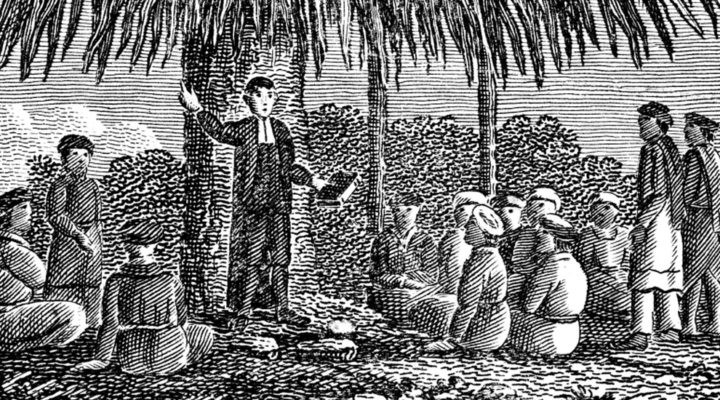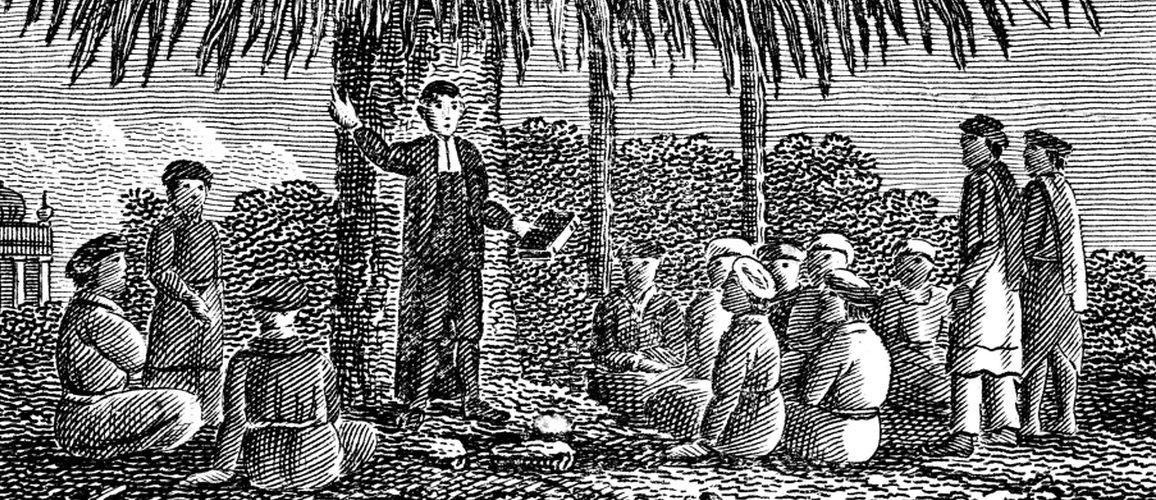Over the more than a half century of my participation in Christian cross-cultural missions, I have noticed a gradual shift in missions strategy. This change is both theologically sound and morally significant. It is a shift to prioritize John 21 over Matthew 28.
To illustrate this transition, I recall two enlightening experiences I had in the Philippines.
The first was when I was a short-term volunteer there in 1967. A Baptist missionary “field evangelist,” along with a “missionary kid” home from college for the summer, several Filipino pastors and my co-worker and I, traveled on a large pontoon boat out into the South China Sea to a small fishing community on a remote island.

Robert Sellers
For several nights, we conducted outdoor evangelistic services in the village. The people gathered for songs and sermons in the dirt yard surrounded by their split bamboo huts. Their homes were simple, tiny shelters with no electricity, running water or indoor sanitation. Even the halazone tablets for purifying the drinking water were brought by our missionary leader and surreptitiously dropped into the storage tanks to protect our visiting party from waterborne illnesses. As far as I could ascertain, our goal was not to improve the daily lives of these poor fishers and their families, but rather to tell them the good news about eternal life in heaven.
The second experience occurred nine years later, when I was back in the Philippines with my wife, Janie, awaiting our visas to enter Indonesia as career missionaries. On Aug. 17, 1976, an earthquake with a magnitude measuring almost 8.0 struck in the Moro Sea, off the western coast of Mindanao, the island on which we were living. More than 8,000 people were killed and 10,000 wounded, as buildings in urban areas like Cotabato City collapsed and coastal villages were swept into the sea by the ensuing tsunami.
In response to the natural disaster, the Philippine Baptist Mission used hunger and relief funds to purchase truckloads of food staples and clothing to distribute to survivors. For the remaining months of our stay on Mindanao, it was not unusual — even in Davao City, hours away from the worst earthquake and tsunami destruction — to see people wearing T-shirts with the message: “Baptists: People who Care!” The goal of this humanitarian effort had not been to save souls but to help rescue and restore lives that had been shaken from their very foundations.
These two memories relate mission strategies of varying scope, urgency and motivation. I suggest that the second methodology was much more effective and transformative. I believe it was also closer to fulfilling the wishes of the risen Jesus and was more reflective of his own earthly ministry, as recorded in the Gospels.
Defining ‘missions’
Allow me to explain a philosophy of missions that undergirds this shift.
To clarify terms, Christian “missions” is comprised of specific strategies and practices for carrying out the “mission” in the world. The mission itself does not originate with human beings or their institutions, including the church. Historically recognized as missio Dei, Christian mission is conceived by God, personified by Jesus, guided by the Holy Spirit and entrusted to Christ’s followers. It is God’s mission toward whose fulfillment faithful Christ-followers should work.
“It is God’s mission toward whose fulfillment faithful Christ-followers should work.”
The orthodox view of Christian mission, especially among Protestant evangelicals, is that Christians must reach out to people in order to bring them to Christian belief. This undertaking is intended to alter the faith identity of those spiritual others as they confess their sins, trust in the atoning death of Jesus on the Cross and determine to live and grow as Christ’s followers.
This understanding of our mission is based upon the “Great Commission” of Jesus, spoken to a crowd on a mountain in Galilee before he ascended into heaven (Matthew 28:16-20). In every era of Christian history, obedient Christ-followers have been committed to preach and convert, baptize and teach new believers. Evangelicals, believing that those who do not accept the personal confessions of traditional Christian doctrine are destined for eternal separation from God in hell, are focused upon trying to “save” as many people as possible. Thus, there is much emphasis upon taking a verbal message about Jesus to “unreached peoples” around the world who have not yet become Christians.
Yet, when Jesus told his parable of the Last Judgment (Matthew 25:31-46), he did not say people would be judged based upon whether they agreed with orthodox Christian doctrines and were identified as Christians. Nor was the criterion for being blessed by God and welcomed into God’s reign dependent upon one’s faithful verbal evangelization of the “lost.” Rather, what mattered was if people extended compassionate acts of kindness and help to the least members of society around them.
A shift in understanding
Taking this parable at face value will necessitate a shift in the way the church understands God’s mission in the world and prioritizes its strategies for accomplishing that mission.
“If we truly love Jesus, we must tend his ‘sheep’ and feed his ‘lambs.’”
The motivation for this kind of Christ work is found in another of Jesus’ last commandments, one given to his disciple Peter on the lakeshore but, by implication, addressed to all Christians. This was the mission Jesus left in the hands of his repentant disciple, one who honestly and fervently confessed his love for his Lord. In this very personal moment, Jesus revealed the desire that was profoundly on his heart — caring for his “little ones.” His yearning and instruction are still relevant today: if we truly love Jesus, we must tend his “sheep” and feed his “lambs” (John 21:15-17).
Identifying himself as the Good Shepherd of these sheep and lambs, Jesus explained that he had come into this world to give them abundant life (John 10:10) — to lead them beside green pastures and still waters, there to enjoy peace, protection and overflowing daily provisions (Psalm 23). He did not come primarily to increase the size of his flock or even to convince them that what really matters is eternal life after death, but rather to enable all of the world’s peoples to experience an abundant, meaningful, peaceful, joyous and flourishing life here and now.
Such abundant life would reflect on earth God’s heavenly reign in heaven. This kingdom where everyone has the opportunity to experience abundant life is not only a new reality for which Christians are to pray (Matthew 6:10), it is the work in the world that Jesus has left in the hands of his followers.
One way to help establish God’s reign on earth is to treat others as our neighbors, to love them — even our enemies (Matthew 5:44) — as we love ourselves (Matthew 22:39). Our mission is to create harmony, friendship and cooperation with others, which is the calling and vocation of peacemaking. It is intriguing that Jesus did not say, “Blessed are the evangelizers” but rather, “Blessed are the peacemakers.” By being peacemakers, we imitate Jesus who is called the Prince of Peace (Isaiah 9:6), reflect God who is Love (1 John 4:16) and who loves the whole world (John 3:16), and will be known as God’s children (Matthew 5:9).
Two illustrations from Indonesia
I observed this shift in missions strategy in two very different incidents in Indonesia.
On the one hand, I heard a story of Christian evangelism while I was meeting with leaders at the Jakarta headquarters of Muhammadiyah, an Islamic reformist non-government organization working on interreligious relations nationwide. I was shown a video that was taken following a devastating earthquake that ravaged much of the city of Padang, Central Sumatra.
“It showed a Christian preacher from America standing on a pile of debris from a fallen building and delivering an aggressive evangelistic message.”
It showed a Christian preacher from America standing on a pile of debris from a fallen building and delivering an aggressive evangelistic message. The Muslim governor of the province was so angered by the insensitivity and inappropriateness of this style of “help” that he forbad further “disaster relief” work from that organization. It was only the insistence of Muhammadiyah that not all Christian organizations work in that fashion that the governor of Padang province continued to allow other Christians to enter and help the victims of the tragedy recover and restore their lives.
On the other hand, while visiting Duta Wacana University and Seminary in Yogyakarta, Central Java, I was told of the humanitarian aid offered through their Mennonite Peace Institute. After a recent earthquake had caused widespread destruction of homes in multiple nearby villages, the Institute was eager to respond.
They hired 100 Muslim carpenters and 100 Christian carpenters, organized them into teams of four — two Muslims and two Christians — and sent them out to multiple villages to help. The Javanese householders, while grateful for the assistance, were startled that Muslims and Christians were able to labor peacefully together.
No verbal message about cooperating as neighbors and friends across religious boundaries had to be preached. Instead, just the sight of those carpenters working together to rebuild their homes and lives was a powerful nonverbal witness that gave these largely Muslim villagers a new appreciation for Christians and Christianity.
God’s mission in the world
God’s mission in the world is to restore the beauty and peace of the Edenic Garden, before there was dissention, envy, hatred and murder in the hearts of all humans created in God’s own image. Strategies for carrying on this mission of God’s should not so much be about fulfilling the Great Commission as obeying the Great Commandment (Matthew 22:36-40).
“God’s mission in the world is to restore the beauty and peace of the Edenic Garden.”
A continuing shift in missions methodologies must lead the church to prioritize Jesus’ command in John 21 to take care for his little ones. In many cases, our good works will permit us to give an “answering witness” — to explain that we express compassionate acts of kindness because of the love of Christ in us and the hope that we have in him.
Our mission, then, is to give opportunities for all peoples to experience an abundant life in this world, treating them as our beloved neighbors, and making peace with them as we follow the teaching and example of Jesus.
Rob Sellers is professor of theology and missions emeritus at Hardin-Simmons University’s Logsdon Seminary in Abilene, Texas. He is a past chair of the board of the Parliament of the World’s Religions in Chicago. He and his wife, Janie, served a quarter century as missionary teachers in Indonesia. They live in Waco, Texas.
Related articles:
Do Southern Baptists need a rebranding? | Analysis by Andrew Gardner
Christian advocacy puts words and actions together in following God | Opinion by Chris Ellis


